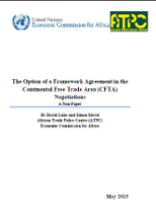The Option of a Framework Agreement in the Continental Free Trade Area (CFTA) Negotiations

A framework agreement in international relations is an interim pact between countries that establishes the principles, scope and details of what has been agreed. A framework agreement normally includes a clear understanding that the outstanding issues will be concluded in an incremental manner and/or by a clearly established date.
In the context of a trade agreement, a framework agreement may encompass ‘an early harvest’ in one or more areas under negotiation, modalities in other areas, a road map with bench marks and time lines to complete the agreement or provisions for the agreement to be completed in an incremental manner taking variable geometry principles into account. A major advantage of a framework agreement is that it enables the negotiating parties to reach an agreement in key areas within a relatively short period of time with a clear mapping of what remains to be accomplished, how and when.
The ASEAN Free Trade Area Agreement which is an agreement in goods only with framework agreements in such areas as services and investment provides a good example of framework agreements as an interim outcome of trade negotiations. The ASEAN framework agreements also provide for the application of variable geometry.